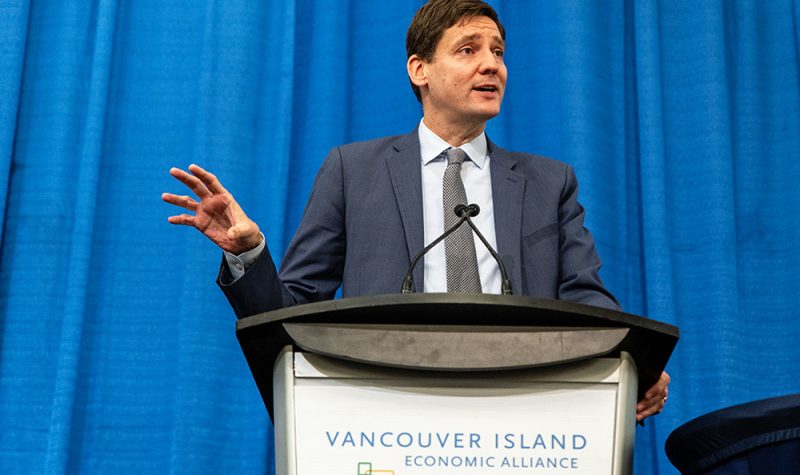Premier David Eby addressed the State of the Island Economic Summit in Nanaimo on Thursday morning, speaking about housing, transportation and the toxic drug crisis.
The premier said the housing and affordability crisis is a drag on the provincial economy and that is why his government introduced legislation to regulate short-term rentals.
“When you have a vacancy rate of less than one per cent it's a drag on the provincial economy, the fact that people can't find housing,” he said. “We literally have strata buildings where 70 and 80 per cent of the units in them are short term rentals. The net effect — whether it's a series of individuals with a single investment unit, or one individual with 70 investment units — is the same, which is that we need those units for people who help make the province go.”
The premier said the province is buying up land around transit corridors to build affordable middle-income housing and is looking to partner with municipalities for innovative solutions such as putting housing on top of fire stations, city halls, schools and on hospital grounds.
“The momentum behind this is very significant,” he said. “I do think ultimately it will be quite transformative as we get back into the business of making sure that the middle class actually has a place to live.”
Eby said Highway 4 closing this summer due the Cameron Lake Wildfire showed him that there is a “desperate need” for a second route to west Vancouver Island. But he was cagey about when it might be announced.
“If I could announce a timeline today, I absolutely would,” he said, adding that the government put “significant resources into the existing road to make it safer.”
The premier said that a new route is a “priority for government” but some proposed routes aren’t technically possible due to slopes through the mountains.
“If anything, all of our minds were sharpened about the need for a second route after the disaster this summer,” he told the audience.
Eby also addressed the ongoing toxic drug public health emergency.
“We've lost almost 13,000 people since the public health crisis was declared in 2016, to overdose,” he said. “And that number conceals the larger bit of the iceberg which is the people who survive overdose with serious brain injury that either impairs their executive function, and they're still wandering around downtown, or that requires them to be in the care of the government for the rest of their lives.”
Eby said that treatment programs in the province are facing a staffing shortage.
“One of our biggest challenges is the skilled professionals to deliver those treatment programs, the social workers, the addictions doctors, the nurses who are experts in this area,” he said. “So we have a Health Human Resources Strategy training up those professionals to be able to open more programs.”
Nanaimo City Coun. Hilary Eastmure said what stood out for her was what Eby didn’t talk about.
”Because of the toxic drug crisis, he highlighted [that] we've had 13,000 deaths, and we're still not talking about a regulated safe supply,” she said. “So we still have toxic drugs on the streets that are killing people at wild rates.”
Nanaimo city council is also grappling with a lack of provincial funding for daytime warming centres this winter.
Eby told reporters after the event that the province was still working with the city to open the navigation centre that was first announced in 2020.
“What we've been trying to identify with Nanaimo is the location for a Navigation Centre, which would be open all day and at night, for people who are unhoused,” he said. “The sooner we can get a location for that and get it open, the better it'll be for everyone in Nanaimo.”
Coun. Eastmure said that while the city is working with the province on a future navigation centre it’s not something that will be in place for this winter.
“Referring to the Navigation Centre, which was announced in 2020 and has yet to come to fruition, does not address at all our concerns about warming centre funding,” she said. “That is a project that's in the distance, we're talking about an immediate crisis.”
With freezing temperatures and the first snow of the season hitting Nanaimo this week Eastmure said that there is a disproportionate number of people in the city that “have no access to any kind of shelter day or night.”
“I still really want the province to come to the table and help us figure this out,” she said. “Because it's cold now and we need a warm place for people to go and be able to have a meal, get some support, and get out of the cold.”
Listen to CHLY’s story below:


